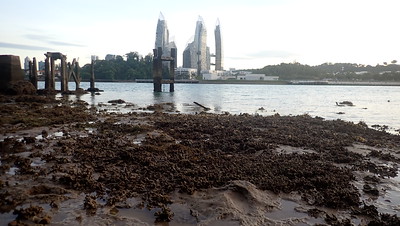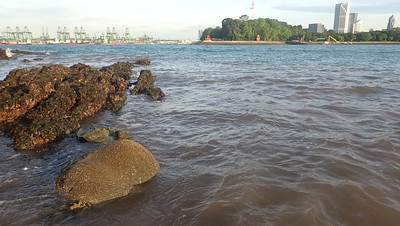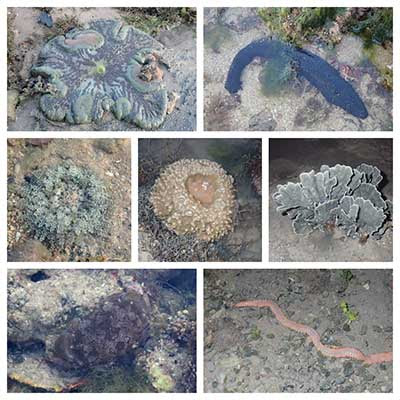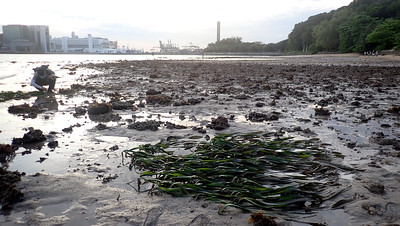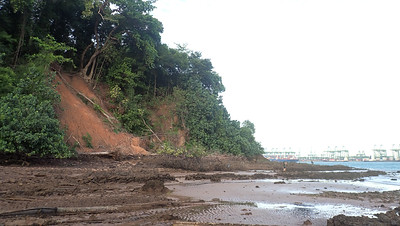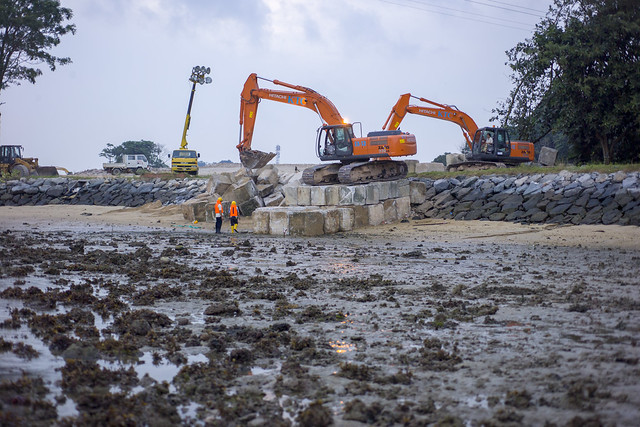Seagrass and hard corals are doing well, leathery soft corals seem to be bigger and more abundant and the rare trees are good. The Common sea star is sighted for the first time since 2009! My last survey here was in Jan 2020, before COVID. Seems a century ago.
There have never been a lot of corals on this shore. But there are still a variety of common corals including some rarer ones like a large Boulder horn coral. Sadly, the large patch of Branching montipora corals are completely dead.
And I also saw a few colonies that were pale, displaying stress colours (pink, blue - i.e., not brown) and some were outright bleaching.
Nevertheless, most of the corals I saw were healthy. Include some impressively large colonies.
I noticed today there were more leathery soft corals, in a good variety, with larger colonies, compared to past surveys.
There were of course all kinds of other marine life on the shore. Sponges in various shapes, sea anemones, crabs, worms. Large black sea cucumbers are common too.Even on narrow sandy areas between the rocky areas, there are sand dollars and acorn worms. With footprints of a Malayan water monitor.Marcus saw a snake-eel!
The rest of the team also saw colourful nudibranchs and flatworms. Here's one Richard Kuah saw.
Vincent Choo saw a Common sea star, the first time we have seen this here since 2009!
On the northern side facing the mainland, the narrow slivers of natural shore that escaped reclamation for Resorts World Sentosa still save many clumps of Tape seagrass with long leaf blades. As on my last survey in in Jan 2020, there was sprinkles of Spoon seagrass with small leaves all over the sandy areas. There are still some small patches of Sickle seagrass and sprinkles of Needle seagrass.
On the southern side, there are lush growth of Tape seagrasses with long leaves and dense growths of Spoon seagrass. At the seawall near Rasa Sentosa, there are lush growth of Sickle seagrass too.
There are, however, some clumps of Tape seagrass with shorter cropped leaves (about 30cm long) and some clumps have long and short cropped leaves. The tips of these cropped leaves are brown and 'crispy'.A nice encounter was some small clumps of Hairy spoon seagrass on the silty northern shores. The first record of this rare seagrass on this shore. I realise that I often see this seagrass in silty soft shores.
There is still a bloom of Bryopsis green seaweed on the shore near Rasa Sentosa. This bloom seems to be never ending. While Sargassum bloom is over, as is normal for this time of the year.
There were signs of two large landslides, a natural feature of natural cliffs. One was on the northern side facing the mainland.On the northern side facing the mainland, the narrow slivers of natural shore that escaped reclamation for Resorts World Sentosa still save many clumps of Tape seagrass with long leaf blades. As on my last survey in in Jan 2020, there was sprinkles of Spoon seagrass with small leaves all over the sandy areas. There are still some small patches of Sickle seagrass and sprinkles of Needle seagrass.
On the southern side, there are lush growth of Tape seagrasses with long leaves and dense growths of Spoon seagrass. At the seawall near Rasa Sentosa, there are lush growth of Sickle seagrass too.
There are, however, some clumps of Tape seagrass with shorter cropped leaves (about 30cm long) and some clumps have long and short cropped leaves. The tips of these cropped leaves are brown and 'crispy'.A nice encounter was some small clumps of Hairy spoon seagrass on the silty northern shores. The first record of this rare seagrass on this shore. I realise that I often see this seagrass in silty soft shores.
There is still a bloom of Bryopsis green seaweed on the shore near Rasa Sentosa. This bloom seems to be never ending. While Sargassum bloom is over, as is normal for this time of the year.
The other landslide was right next to the mama Nyireh laut and her daughter! Seems they narrowly missed being wiped out. Nyireh laut is Critically Endangered in Singapore and we probably have only about 7 trees on our shores. 3 of them are found on this shore. Besides these two, one is growing near the pillbox and it is still doing alright. But I couldn't find the very young Nyireh laut that has settled under the cliff some distance from the mother tree. I did see it on our last survey in Jan 2020.
Plants can also be wiped out by trees falling off the cliff. I couldn't find the Endangered Delek Air, a large fallen tree was where it usually was.
The long line of floating drums are still there since I saw them on our survey in Dec 2018. They were absent during our survey in Jul 2017 and Jan 2018 so they must have been reinstalled since then. These are a 'security barrier' first installed in 2012. I also notice that recently, large ships are often parked very close to the shore.
I didn't come across any nets on the shore, but I did see an abandoned fishing rod.
It is always bitter sweet for me to survey this shore. I had helplessly watched some of the reefiest parts of the northern shoreline being buried for Resorts World Sentosa more than 10 years ago. I took this photo in 2007.
Massive construction on the shore in 2008.
Ongoing construction of Resorts World in 2009. How ironic that our priceless reefs are buried to create artificial marine habitats that profess to support marine conservation. And when they fail, will they even attempt restore the reef back to the way it was before?
This is the same spot today. One of the perks of a predawn survey is a glorious sunrise! Let's hope this beautiful shore remains safe until we can visit again.
Photos by others on this survey
Marcus Ng
Richard Kuah
Vincent Choo
James Koh on flickr



